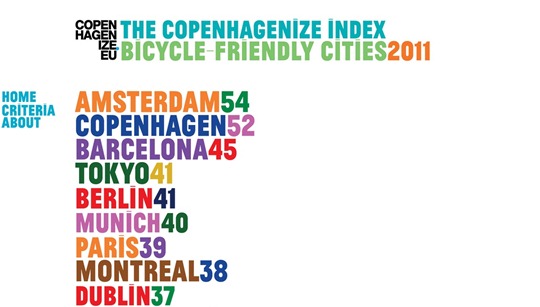The Copenhagenize Index of Bicycle-Friendly Cities 2011
The Danish firm Copenhagenize Consulting recently released its list of the top 20 bicycle-friendly cities in the world for 2011. The “Copenhagenize Index” as it’s called, puts Amsterdam in the #1 spot, scoring 54 out of a possible maximum score of 64, with Copenhagen itself placing second with a score of 52.
Montreal was the only Canadian city to make the list. Toronto’s current political climate and lack of on-street bicycle infrastructure keeps it off the list, and Vancouver’s “sporty” bicycle culture and mandatory helmet law + lack of bike sharing keeps it off the list.
The Copenhagenize Index uses a criteria based on 13 categories, and each city receives a score 0 to 4 for each criteria with a chance to win 12 bonus points for “impressive efforts or results”. The 13 categories include:
- Advocacy
- Bicycle Culture
- Bicycle Facilities
- Bicycle Infrastructure
- Bike Share Programme
- Gender Split
- Modal Share For Bicycles
- Modal Share Increase Since 2006
- Perception of Safety
- Politics
- Social Acceptance
- Urban Planning
- Traffic Calming
On a personal level, I was glad to see these results released, because in 2010 I had drafted the original criteria which was used as a starting point for the Copenhagenize Index.
A substantial amount of work has been done by Copenhagenize Consulting since I first pitched my criteria to Mikael in June 2010. The team has further refined the criteria to make it more credible and a great deal of work has gone into gathering the statistics.
The initial criteria that I drafted contained just 5 categories and a maximum score of 10 for each category. I based my scoring system on the level of the Capability Maturity Model – a model that measures an organization’s software development processes (my day job involves software development).
Here is a snapshot of the original criteria I pitched to Mikael:
It is great to see that Mikael and his team at Copenhagenize Consulting have turned this initial criteria into a comprehensive criteria for ranking cities around the world for their acceptance of the bicycle as a viable and respected mode of transportation.
I hope to see more cities competing for these top spots in the coming years as we push for the bicycle to become a socially acceptable mode of transportation in western societies.
James D. Schwartz is a Transportation Pragmatist and the Editor of The Urban Country. You can contact James at james.schwartz@theurbancountry.com or follow him on Twitter.
Related Articles:
- Rediscovering The Bicycle 17 Years Later (Sept 2011)
- Motorists Against Bicycle Infrastructure (Oct 2010)
- Making Sure Nobody Walks or Bikes (May 2011)
- Montreal Bicycle Ridership Up 35-40% (Dec 2010)





Hopefully we can get on the list… slowly but surely things are changing for the better.. thanks for all the work you do behind the scenes..
Hopefully we can get on the list… slowly but surely things are changing for the better.. thanks for all the work you do behind the scenes..
this is a well considered rating system, and the basis of one that might get some real traction. Gender split and urban planning are two especially welcome inclusions, making a departure from the days when The League of American Wheelmen spoke on cyclists’ behalves. Mikael, if you’re reading, can I encourage you to push it a bit further. Maybe we can find an academic, or more likely a PhD candidate, to run it through some academic hurdles, then bring in others’ input to the point where it is grounded upon the widest possible consensus. That would require relinquishing just a little control though 🙂
this is a well considered rating system, and the basis of one that might get some real traction. Gender split and urban planning are two especially welcome inclusions, making a departure from the days when The League of American Wheelmen spoke on cyclists’ behalves. Mikael, if you’re reading, can I encourage you to push it a bit further. Maybe we can find an academic, or more likely a PhD candidate, to run it through some academic hurdles, then bring in others’ input to the point where it is grounded upon the widest possible consensus. That would require relinquishing just a little control though 🙂
Glad to see my Tokyo made fourth. Tokyo is the unsung cycling capital of E.Asia. I’ll save you a long winded explanation, but if you care for it go to my blog.
Glad to see my Tokyo made fourth. Tokyo is the unsung cycling capital of E.Asia. I’ll save you a long winded explanation, but if you care for it go to my blog.
That’s pretty impressive to have a Canadian city in the top 10, and not surprising that it’s Montréal.
I have found San Francisco has as much of a ‘sporty’ bike culture as Vancouver does (minus the helmet law), but Vancouver has some pretty good (separate) bike lanes.
I’m not that surprised Toronto isn’t on the list. I do believe Ottawa is slightly ahead of Toronto right now.
Rio was a bit of a surprise. Much ‘bike-news’ I hear out of Rio is all negative.
Barcelona is probably the best example for North American cities to follow. Fairly crappy for cycling just a few years ago and now it ranks #3.
That’s pretty impressive to have a Canadian city in the top 10, and not surprising that it’s Montréal.
I have found San Francisco has as much of a ‘sporty’ bike culture as Vancouver does (minus the helmet law), but Vancouver has some pretty good (separate) bike lanes.
I’m not that surprised Toronto isn’t on the list. I do believe Ottawa is slightly ahead of Toronto right now.
Rio was a bit of a surprise. Much ‘bike-news’ I hear out of Rio is all negative.
Barcelona is probably the best example for North American cities to follow. Fairly crappy for cycling just a few years ago and now it ranks #3.
I’m surprised Davis isn’t on the list. It has a better bike infrastructure and usage than San Francisco. Of course Los Angeles shouldn’t be any where near that list. Using your criteria, I gave us Angelinos a 13. We’re working to change that slowly but until the infrastructure and attitudes change it’s going to take a long time.
I’m surprised Davis isn’t on the list. It has a better bike infrastructure and usage than San Francisco. Of course Los Angeles shouldn’t be any where near that list. Using your criteria, I gave us Angelinos a 13. We’re working to change that slowly but until the infrastructure and attitudes change it’s going to take a long time.
@grrlyrida I’m guessing they only did large cities, which would explain why Davis isn’t on the list.
If they did smaller cites, not only would the list be much longer, but I expect some smaller Dutch cities, such as Utrecht and Groningen, would probably even beat Amsterdam.
As for the cities on the list, I wouldn’t put Paris ahead of Montreal. I think they may be placing too much emphasis on Bike sharing and not enough on infrastructure. Distinguishing quantity and quality of infrastructure as two different categories would help. Amsterdam should be well over 2 points ahead of Copenhagen.
@grrlyrida I’m guessing they only did large cities, which would explain why Davis isn’t on the list.
If they did smaller cites, not only would the list be much longer, but I expect some smaller Dutch cities, such as Utrecht and Groningen, would probably even beat Amsterdam.
As for the cities on the list, I wouldn’t put Paris ahead of Montreal. I think they may be placing too much emphasis on Bike sharing and not enough on infrastructure. Distinguishing quantity and quality of infrastructure as two different categories would help. Amsterdam should be well over 2 points ahead of Copenhagen.
I am looking for Milton Keynes, UK in this list. It has over 200km designated cycle paths called ‘The Redways’….beautifully maintained. I would not risk my life cycling in London or Dublin however.
I am looking for Milton Keynes, UK in this list. It has over 200km designated cycle paths called ‘The Redways’….beautifully maintained. I would not risk my life cycling in London or Dublin however.
How is it that Minneapolis didn’t make it? Bike lanes, bike trails, bike sharing, no helmet law, bike education programs, bike-friendly buses and trains, etc. What gives?
They only measured “major cities”. There are plenty of smaller cities that would have made the list had they opened it up to smaller cities as well as large cities.
From the About page: “At the end of the day we rated over 80 major cities around the world. Ideally we would have liked to have included smaller cities but based on the time we were using on the index we narrowed it down to major cities. We know that smaller cities like Groningen, Netherlands or Malmö, Sweden would have fared extremely well, but we had to draw the line somewhere.”
http://copenhagenize.eu/index/about.html
How is it that Minneapolis didn’t make it? Bike lanes, bike trails, bike sharing, no helmet law, bike education programs, bike-friendly buses and trains, etc. What gives?
They only measured “major cities”. There are plenty of smaller cities that would have made the list had they opened it up to smaller cities as well as large cities.
From the About page: “At the end of the day we rated over 80 major cities around the world. Ideally we would have liked to have included smaller cities but based on the time we were using on the index we narrowed it down to major cities. We know that smaller cities like Groningen, Netherlands or Malmö, Sweden would have fared extremely well, but we had to draw the line somewhere.”
http://copenhagenize.eu/index/about.html